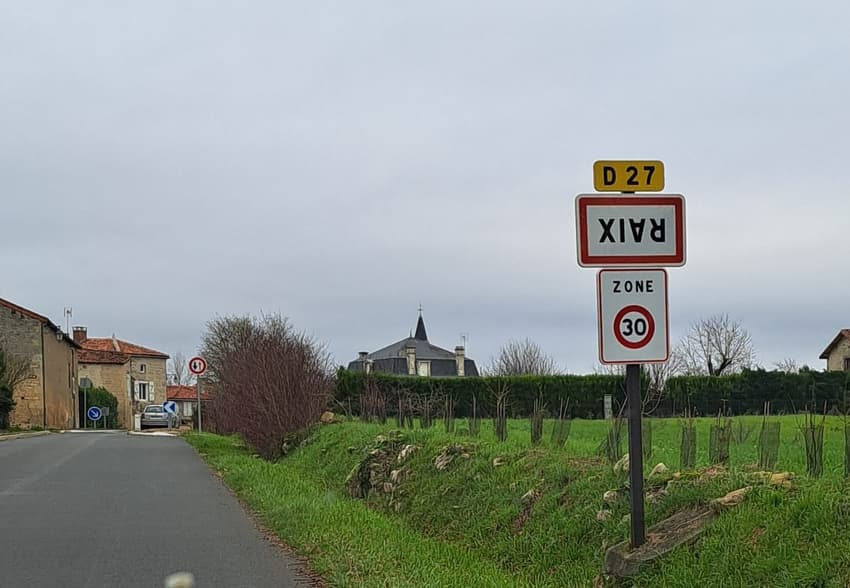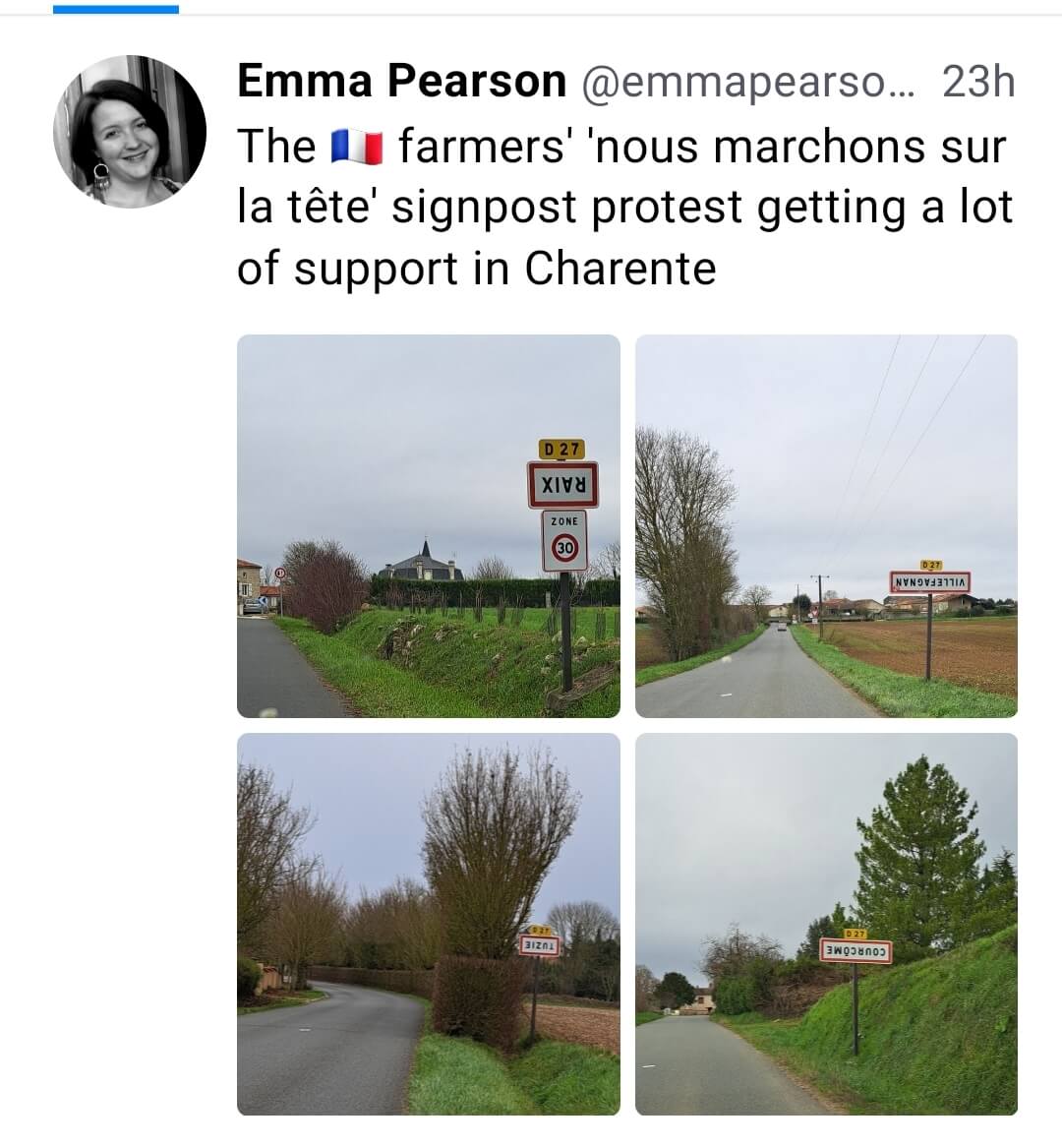Why are the road signs upside down in rural France?

If you're driving through rural France you may begin to notice an oddity - signs for towns and villages turned upside down.
As you enter a French town or village by road you'll be greeted with the standard rectangular highway sign telling you the name of the place.
But in an increasing number of areas in rural France, these signs are upside down.
No, it's not a sudden mass failure of the screws holding the signs up - this is, in fact, a protest.
Young farmers are heading out into their local communities, armed with a screwdriver, to turn the welcome signs upside down - and in many communes local authorities have decided to leave them like that as a mark of solidarity (or because they haven't got round to turning them round yet).
The protests began in Tarn in south-west France but have spread through the country and upside down signs can now be seen from the Mediterranean coast up to Normandy and Brittany in the north.

They are accompanied by the slogan 'Nous marchons sur la tête' (we're walking on our heads) to signal a world turned upside down or a policy that makes no sense.
The reason for these strange happenings? It's a protest, largely orchestrated by the farming union that represents young agriculture workers.
The Jeunes Agriculteurs protest is relatively mild by the standard of French farmers' protests (favourite methods include dumping loads of rotting food or manure outside government buildings or simply driving two-abreast at snails' pace along the road, creating lengthy tailbacks).
However, the protests could ratchet up in 2024.
OPINION French farmers' signpost protest could indicate a major clash the horizon
So what are they protesting about? Overall, they are dissatisfied with the government's policy on agriculture, but their demands are a mixture of the domestic, European and global - and some have already been met.
Prime minister Elisabeth Borne met with farming unions at the start of December and immediately agreed to two of their more specific demands - licence fee increases for water pumping and pesticide use have been scrapped from the 2024 budget.
However other grievances remain relating to tax and diesel and payment of EU subsidies. French farmers are also bitterly opposed to the EU's Mercosur treaty with South America which, they say, would flood the European market with cheap Brazilian and Argentinian beef.
Unions also complain that the French government is following a contradictory agricultural policy in which farmers are supposed to become more eco-friendly but also increase yields, and keep prices low to limit food price inflation.
Philippe Bardy, leader of the main agricultural union, the FNSEA, in Tarn said: “Government wants us to change the way we farm; it also urges us to produce as much as possible in the name of food sovereignty. They pressure us to keep salaries high; they also demand that we reduce prices to calm inflation.”
Comments
See Also
As you enter a French town or village by road you'll be greeted with the standard rectangular highway sign telling you the name of the place.
But in an increasing number of areas in rural France, these signs are upside down.
No, it's not a sudden mass failure of the screws holding the signs up - this is, in fact, a protest.
Young farmers are heading out into their local communities, armed with a screwdriver, to turn the welcome signs upside down - and in many communes local authorities have decided to leave them like that as a mark of solidarity (or because they haven't got round to turning them round yet).
The protests began in Tarn in south-west France but have spread through the country and upside down signs can now be seen from the Mediterranean coast up to Normandy and Brittany in the north.

They are accompanied by the slogan 'Nous marchons sur la tête' (we're walking on our heads) to signal a world turned upside down or a policy that makes no sense.
The reason for these strange happenings? It's a protest, largely orchestrated by the farming union that represents young agriculture workers.
The Jeunes Agriculteurs protest is relatively mild by the standard of French farmers' protests (favourite methods include dumping loads of rotting food or manure outside government buildings or simply driving two-abreast at snails' pace along the road, creating lengthy tailbacks).
However, the protests could ratchet up in 2024.
OPINION French farmers' signpost protest could indicate a major clash the horizon
So what are they protesting about? Overall, they are dissatisfied with the government's policy on agriculture, but their demands are a mixture of the domestic, European and global - and some have already been met.
Prime minister Elisabeth Borne met with farming unions at the start of December and immediately agreed to two of their more specific demands - licence fee increases for water pumping and pesticide use have been scrapped from the 2024 budget.
However other grievances remain relating to tax and diesel and payment of EU subsidies. French farmers are also bitterly opposed to the EU's Mercosur treaty with South America which, they say, would flood the European market with cheap Brazilian and Argentinian beef.
Unions also complain that the French government is following a contradictory agricultural policy in which farmers are supposed to become more eco-friendly but also increase yields, and keep prices low to limit food price inflation.
Philippe Bardy, leader of the main agricultural union, the FNSEA, in Tarn said: “Government wants us to change the way we farm; it also urges us to produce as much as possible in the name of food sovereignty. They pressure us to keep salaries high; they also demand that we reduce prices to calm inflation.”
Join the conversation in our comments section below. Share your own views and experience and if you have a question or suggestion for our journalists then email us at [email protected].
Please keep comments civil, constructive and on topic – and make sure to read our terms of use before getting involved.
Please log in here to leave a comment.